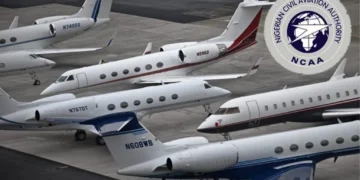[ad_1]
Freight forwarders in the country have called on the Federal Government, through the Nigeria Customs Service (NCS) to key into the evolution of smart borders and ensure concepts that would further facilitate trade.
The experts during a strategic consultative meeting in Lagos recently urged Customs to facilitate legitimate trade that will in turn contribute positively to economic growth, as well as boosting job creation.
The Strategic Consultative Meeting was led by the FIATA Nigeria Designate Representative / Former Chairman CRFFN Governing Council, Aare Hakeem Olarenwaju; the Former National President of Association of Nigerian Licensed Customs Agents (ANLCA), Prince Shittu Olayiwola; and Former National President of National Association of Government Approved Freight Forwarders (NAGAFF), Dr Eugene Nweke.
The group in a communiqué said the consultative meeting was prompted by noticeable absence of professional touch in the emerging trends and at the on-going global discourse by the comity of global freight forwarding nations.
The group said the evolution of the smart borders concept is in support of the Sustainable Development Goal (SDG) of the United Nations (UN) Agenda 2030.
The concept, according to the group, makes room for Customs to ensure; timely delivery of raw materials to industries; reduce unfair business competition; open opportunities for all business interests to access raw materials; creates a transparent, conducive and predictable conditions for trade/passengers, and facilitate legitimate trade that will in turn contribute positively to economic growth, as well as boosting job creation.
The group resolved to carry out a robust review on the level of compliance to the SGD from the Nigeria freight forwarders perspective, and document same for global representation.
Equally, the meeting took a holistic review of the present clearance process and procedures within the Customs ports, with deep reservation even though, commending its efforts at reinstalling mobile scanner machines at some ports.
The group also examined the freight forwarding practices which revolves around a Growing E-Commerce Logistics Solution – where information communication technology drives the international trade security and value adding supply chain.
It also plans to revisit the current annual growth rate in the thriving: Business to Customer (B2C), Business to Business (B2B) and the Producer to Consumer (P2C).
It noted the grappling challenges inherent in this increasingly demanding innovative logistics solutions. Wherefore, it posited that, there would be need to chant a course towards the growing need to choose the right kind of Customs procedures that will open new potential for improvement and advancement of the evolving new markets concepts.
[ad_2]







